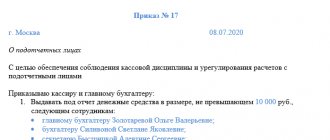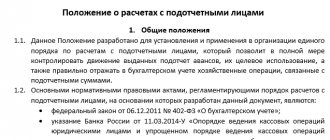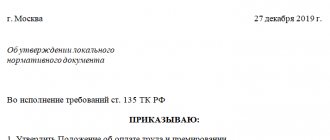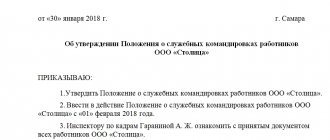Legal nature of contributions to NPOs
According to Art.
26 of the Law “On Non-Profit Organizations” dated January 12, 1996 No. 7-FZ (hereinafter referred to as Law No. 7-FZ), the property of some NPOs is created, including through regular income from the founders or members who later joined the organization (general information about NPOs can be obtained in the article Peculiarities of the legal capacity of non-profit organizations). Based on sub. 3 clause 1.1 art. 14 of Law No. 7-FZ, an NPO may classify the payment of contributions as the responsibilities of members of the organization and describe this in the charter. Failure to comply with payment obligations may result in termination of membership. The law does not establish a mandatory form and frequency of payment of contributions, leaving this to the discretion of the NPO itself. As a general rule, contributions are paid in cash, since the law does not provide for a mechanism for assessing contributions in kind, in contrast to the assessment of contributions to property upon establishment. Contributions are paid in rubles.
How membership fees are reflected in the tax accounting of a non-profit organization, read the material prepared by the ConsultantPlus expert. If you do not yet have access to the ConsultantPlus system, you can obtain it free of charge for 2 days.
Accounting of organizations for contributions to SRO: postings
The costs of paying contributions to the SRO are associated with the costs of ordinary activities and participate in the formation of the cost of design, survey, and construction work. There is a production need to join a partnership. Without permission to carry out specialized work, construction activities cannot be carried out.
Example of transactions for enterprises when paying for membership
The construction organization “Vector” has prepared documents for joining the NP SRO. The governing body issued invoices for payment of a one-time fee in the amount of 19,000 rubles, a monthly membership fee in the amount of 3,500 rubles. The payment to the compensation fund was spread over 3 years at 150,000 annually. The following entries were made in the accounting of Vector LLC:
| Operation | Debit | Credit | Sum |
| Payment of membership fee upon joining | 76 | 51 | 19 000 |
| Writing off the amount as part of current expenses | 20 (26) | 76 | 19 000 |
| Payment of part of the contribution to the compensation fund | 76 | 51 | 150 000 |
| Reflection of the amount as part of deferred expenses | 97 | 76 | 150 000 |
| Payment of membership fees | 76 | 51 | 3 500 |
| Writing off the amount as part of current expenses | 20 (26) | 76 | 3 500 |
| Monthly write-off of the amount against deferred expenses | 20 (26) | 97 | 12 500 |
Membership fees of a monthly or quarterly payment are taken into account as part of current expenses, compensation fees are written off during the entire validity period of the issued certificate. Regarding the write-off of a one-time contribution, the organization makes a decision independently, depending on the conditions of internal accounting.
Frequency of payment of contributions
The charter of an NPO or, if provided for in the charter, the highest collegial management body of the organization may determine the following payment periods:
- monthly (in very rare cases, most often this frequency is typical for trade unions that belong to non-profit organizations in accordance with the provisions of the Law “On Trade Unions” dated January 12, 1996 No. 10-FZ and self-regulatory organizations);
- quarterly (in most cases);
- annually (usually in the 1st quarter of the year).
A new member of an NPO pays fees only for the period of his participation in the activities of the organization. It is unlawful to impose on him the obligation to pay them for earlier periods or periods after leaving the organization (see the decision of the 9th Arbitration Court dated April 14, 2015 in case No. A40-174848/2014).
Some non-profit organizations set different terms and amounts of NPO membership fees for different groups of members. In this case, it is advisable to adopt a regulatory document (regulations on membership fees) and approve it by decision of the collegial governing body.
For self-regulatory organizations (SROs), drawing up regulations on the procedure for paying contributions is a mandatory requirement established by clause 3 of Art. 12 of the Law “On Self-Regulatory Organizations” dated December 1, 2007 No. 315-FZ (an alternative option for regulating the amount of contributions may be provided for by the charter of the SRO or the law). The regulations are approved only by a general decision of the meeting of participants.
Features of accounting for contributions to SRO
Self-regulatory organizations (SROs) are non-profit partnerships with the aim of uniting organizations and individual entrepreneurs in the design, construction, and survey fields. The community provides legislative and legal support to members. The functions of the governing body include monitoring the professional level of workers in construction organizations. The Charter of the NP SRO limits the list of current tasks carried out through contributions.
Expenses include costs associated with:
- Ensuring the reception of members - publishing materials, providing legal assistance.
- Maintenance of premises, office equipment, management and audit body.
- Carrying out qualification retraining of specialists and other statutory tasks.
When joining an NP SRO, organizations pay a one-time entrance fee, a payment to the compensation fund, which is spent to cover claims from partners and penalties for the results of construction activities.
Spending of contribution funds
The intended purpose of using the funds contributed by members of the NPO will be the maintenance and operational activities of the organization. They are not used to form the organization’s property and are not subject to income tax (see subparagraph 1, paragraph 2, article 251 of the Tax Code of the Russian Federation).
The non-profit nature of the organization’s activities imposes another limitation on the spending of contributions: they can only be used to finance statutory activities. Misuse of funds will lead to their recognition as income and subsequent taxation (Clause 14, Article 250 of the Tax Code of the Russian Federation).
Consequently, only 2 directions for using contribution funds will be legal:
- for the maintenance of the management apparatus (rent, wages, expenses for the operation of the apparatus);
- conducting statutory activities.
The acquisition of property, securities of any nature (shares, certificates of deposit), fixed assets or their use for business purposes will automatically be recognized as misuse. The decision on spending funds is made by the executive body, which is given the right to dispose of the property of the NPO within certain limits.
How you can spend funds acquired, including from contributions, is described in the article Finance in non-profit organizations (nuances).
Payment of contributions: procedure and consequences of delay
When transferring funds by members of NPOs - legal entities, in payment orders it is necessary to indicate the intended purpose of the funds as a membership fee. This will serve 2 purposes:
- tax, proving the targeted nature of the payment;
- corporate, confirming the very fact of payment, which will also become necessary evidence in court in the event of a dispute with a participant.
An individual has the right to pay membership fees to the organization's cash desk by issuing a cash receipt order. The charter of an NPO may establish a procedure for paying penalties in case of late payment of funds. In practice, when collecting arrears in payment of contributions, the NPO also asks to collect interest for the use of other people's funds and these demands are satisfied (see resolution of the 9th Court of Appeal dated 02/07/2014 No. A40-76488/2013).
Debt in payment of overdue membership fees cannot become the basis for an NPO to submit demands to initiate bankruptcy proceedings, since, according to clause 2 of Art. 4 of the Law “On Insolvency (Bankruptcy)” dated October 26, 2002 No. 127-FZ, they do not belong to the type of monetary obligations that are taken into account when determining the signs of bankruptcy of a debtor (see the resolution of the Arbitration Court of the North Caucasus District dated July 18, 2014 in the case No. A53-854/2014).
Membership Terms
Regulations on membership in the Association “Club of Accountants and Auditors of Non-Profit Organizations”
I. General provisions
- Members of the Association “Club of Accountants and Auditors of Non-Profit Organizations” (hereinafter referred to as the Club) can be individuals and legal entities who recognize the Charter of the Club, the Code of Ethics for Accountants and Auditors of the Third Sector, and who pay membership fees on time.
The Club provides the following types of membership:
- individual members of the Club,
- collective members of the Club,
II. Conditions and procedure for admission to Club membership
- Individuals wishing to obtain the status of an individual member of the Club submit an application of the established form (Form No. 1) to the Club Board. The following details must be filled out in the application:
- date of,
- personal signature,
- Full Name,
- contact number,
- postal address for communication, zip code.
When submitting an application, an entrance fee of 3,000 rubles is paid (in cash), or a copy of the document confirming payment of the entrance fee by bank transfer is provided.
Individuals (citizens of the Russian Federation) are accepted as members of the Club without restrictions on place of residence, citizenship, place of work and other characteristics.
- Collective members of the Club in accordance with the Charter of the Club and the Federal Law “On Non-Profit Organizations” can be Russian legal entities that meet the requirements of Art. 15 of the Federal Law “On Non-Profit Organizations”.
Legal entities wishing to obtain the status of a Club member submit the following documents to the Club Board:
- application of the established form (form No. 2), signed by the head of the legal entity. The following details must be filled out in the application: date,
- signature of the official,
- “The decision to join the Association “Club of Accountants and Auditors of Non-Profit Organizations” was made at a meeting of the governing body of the legal entity “___” _____________ 202_ (minutes No. _____)”
- full official name of the legal entity,
- information about state registration,
- authorized representative (last name, first name, patronymic),
- contact number,
- postal address for communication, zip code,
- The decision on admission to the Club membership or refusal of admission is made at the General Meeting of Club members on the basis of relevant documents submitted by individuals or legal entities, within no more than a year from the date of submission of the application.
- Individual members of the Club are issued membership cards of the established form. Collective members of the Club are issued certificates of the established form.
- At the request of a Club member, a duplicate may be issued to replace a lost membership card or certificate.
- Membership in the Club does not impose any restrictions on its members in their main or any other activities.
- Legal entities carry out membership in the Club through their authorized representatives.
- The club is the holder of the register of its members.
III. Procedure and deadlines for paying membership fees at the Club
- Individual members of the Club will pay an annual membership fee of 3,000 rubles in 2022.
The following deadlines for payment of the contribution are established:
- for Club members who joined before 01/01/2021 - before July 1, 2021, and at least half of the fee must be paid no later than March 1, 2022,
- for Club members who joined from 01/01/2021 to 05/01/2021. - until July 1, 2022, while at least half of the contribution must be paid no later than two months from the date of submission of the application for membership,
- for Club members who joined from 05/01/2021 to 11/01/2021. - within two months from the date of submission of the application for entry,
- Club members who joined from 11/01/2021. until December 31, 2021, no membership fee will be paid in 2021.
- Club members permanently residing (registered) outside the Moscow region will pay an annual membership fee in 2022 no later than 12/31/2021.
- Collective members of the Club will pay an annual membership fee in the amount of 6,000 rubles in 2022. The due date for payment of the contribution is until March 1, 2021, and in case of entry after this date - no later than two months from the date of entry.
- Individuals who do not have the means to pay the entrance and/or membership fee have the right to submit a personal application to the Club Board, which reviews these applications and individually decides on exemption from paying the fee for the current year. Legal entities are not provided with benefits for paying contributions.
- Contributions can be paid in cash at a Club meeting or transferred by bank transfer using the following details:
Recipient:
Association "KBA NPO"
INN: 7703379970,
Checkpoint: 771301001,
Current account: 40703810238040104242,
PJSC "Sberbank", Moscow,
corr. account: 30101810400000000225, BIC: 044525225
- Individuals who have submitted an application to join the Club and have not paid the annual fee or part thereof within two months from the date of submission of the application in accordance with clause 10 of these Regulations are not accepted as individual members. The paid entry fee will not be refunded to these individuals.
In the future, these individuals may re-apply for membership in the Club.
IV. Basic rights of Club members
- In accordance with the Club Charter, Club members, regardless of the type of membership, have the right:
- participate in the management of the Club’s affairs;
- make proposals to improve the legislation and regulatory framework in the field of accounting, audit, taxation and other issues related to the activities of Club members;
- participate in the development of documents defining the main directions of the Club’s activities;
- participate on preferential terms in events held by the Club, in particular, in Congresses, conferences, symposiums, seminars, etc.;
- directly contact the Club for assistance and assistance in order to protect professional interests;
- enjoy the full support of the Club when considering issues affecting the interests of Club members in government and management bodies;
- receive information about the activities of the Club;
- use the Club’s symbols on the terms and in the manner determined by the Club’s Coordination Council and in accordance with current legislation;
- seek assistance and receive recommendations from the Club for employment;
- At any time, resign from the membership of the Club by writing a corresponding application to the Club Board,
- Elect and be elected to the governing bodies of the Club;
Club members may have other rights provided for by the Charter and current legislation.
V. Responsibilities of Club members
- Members of the Club, regardless of the type of membership, voluntarily assume the following responsibilities:
- comply with the provisions of the Charter and Code of Ethics of the Club,
- contribute in every possible way to solving the problems facing the Club;
- implement decisions of governing bodies;
- pay membership fees in a timely manner in the manner and amounts established by the Club’s Coordination Council,
- attending general meetings of Club members (in accordance with clause 5.1 of the Charter, they are held at least once every 5 years)
In case of termination of membership in the Club, the Club member is obliged to return the Club membership card and stop using the Club symbols, if permission to use it was received by virtue of his status as a Club member.
Counter-provision from NPOs
By paying a membership fee, a member of the organization expects to receive some kind of consideration from the NPO, often of an intangible nature. This rule is presumed, but does not have a mandatory, statutory nature.
Among the forms of consideration are:
- issuing membership cards;
- representing the interests of members in relations with third parties and authorities;
- invitation to NGO events free of charge;
- free provision of legal and consulting services to non-profit organizations, including socially useful ones, according to the list determined by Decree of the Government of the Russian Federation of October 27, 2016 No. 1096;
- use of the library and electronic databases of the NPO, its property.
For non-profit partnerships and self-regulatory organizations, the consideration may be access to certain types of work. But it should be borne in mind that refusal to receive counter-provision is not grounds for non-payment of contributions. This responsibility falls on all members of society, regardless of their involvement in its affairs or receipt of reciprocal services.
Termination of membership is also the basis for termination of the right to receive consideration (see resolution No. A40-76488/2013). The format of such a refusal may be the return of documents (certificate of admission to work, membership card).
Control over the expenditure of membership dues
According to Art. 32 of Law No. 7-FZ, the activities of NPOs are controlled by the state and society. Information about the property of an NPO and its expenditure cannot be a commercial secret. All information about the flow of funds (if during the year the NPO received no more than 3 million rubles in the form of property and cash) is presented in the NPO report, which is submitted annually to the Ministry of Justice (clause 3 of Article 32 of Law No. 7-FZ).
The NPO confirms the intended use of funds to the tax authorities by annually submitting in the reporting package a report form on the intended use established by clause 2 of Art. 4 of the Law “On Accounting” dated December 6, 2011 No. 402-FZ. Members of the organization can independently control the expenditure of funds by establishing a mandatory procedure for reporting by the executive body by decision of the collegial body.
***
Contributions to an NPO are one of the forms of financing a non-profit organization, but their spending must be treated with the utmost care.
Members of the organization have the right to control it and the tax authorities are obliged. You can find more complete information on the topic in ConsultantPlus. Free trial access to the system for 2 days.




